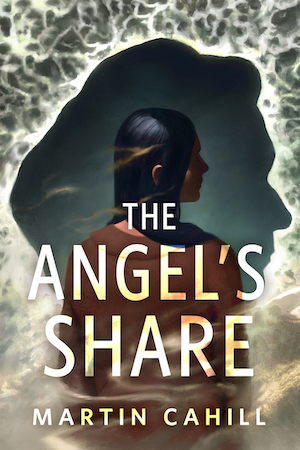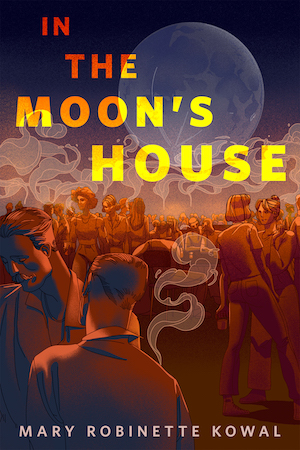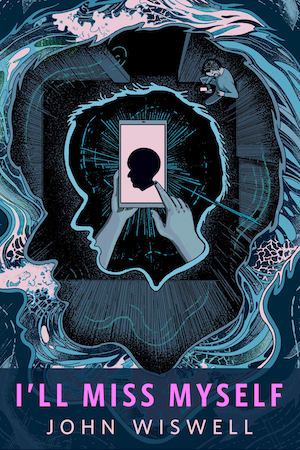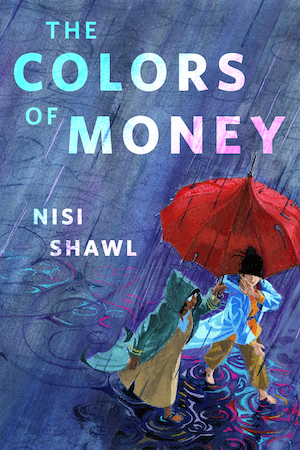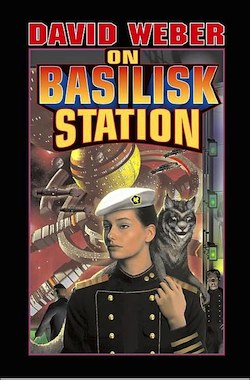Any series whose hook starts with “Napoleonic wars IN SPACE” has potential, but when the rest is “fought by a kickass woman with a telempathic cat” I knew I was in for a rollicking good time. On Basilisk Station, and indeed the entire Honor Harrington series by David Weber, never fails to make me thrill with wonder and delight as I tear through the books and then, later, as I digest it, to think of all the sociological philosophy he snuck in while I wasn’t looking! I certainly absorbed it as I read, but it didn’t hit me immediately. I was much more concerned with whether Honor’s spaceship would actually fall apart mid-battle, or her crew would betray her, or the Empire that I was beginning to love would be torn apart. Afterwards, when I caught my breath, I had time to look back and marvel at the depth and breadth of the issues Weber started to tackle.
The structure and set-up is absolutely influenced by stories of Admiral Nelson and Horatio Hornblower, but Weber’s loving homage to classic space-opera is equally clear. The brilliance of these books though, is that Weber transcends both the genre as it stood before him and the heroic tales he’s drawing on. He presents us with an incredible modern reimagining of these stories with strong female characters and little though I realized it as I gulped my way through them in depth thoughts on the respective merits of different economic systems. Which makes it sound like a weighty and boring tome, but I promise you, it isn’t; there’s literally something to make everyone perk up their treecat ears and say “bleeeeek?” in interest.
Weber does an incredible job—right from the beginning—of interweaving a whole slew of concepts and characters without ever diluting the power of the narrative. There are great descriptions of futuristic space-battle-ships, the requisite (at least for me) telempathic pet, intergalactic politics, guns-blazing battles and a rebellious crew. He manages to create perfect, intimate moments and settings within a great sweeping, interstellar setting and plot.
This is a series that really lets you read it as you will it lends itself easily to being read as an action-adventure series and you can skim through the first ten in a week (well, I did) caring only about what will happen next to Honor and whether she survives each incredible challenge. Or if you are so inclined, David Weber has built a whole, incredible universe and history for you to play in. There are incredibly detailed descriptions of entire fleets of different kinds of ships, the history and chronology of the different star systems, the astronomy of their planets and space, the physics behind the transportation, ships and planets, and the biology and zoology of alien races. But he seeds it all throughout the books so we learn without noticing and it’s not till you stop and really look back that you realize what a huge undertaking this whole universe is, and what a masterful craftsman Weber shows himself to be. But why take my word for it? Go read them at the Baen Library! Just come back after and tell me what you think.
The prologue opens on whatever the equivalent of a cabinet meeting is, thousands of years in the future, with an interesting extrapolation of economic theory—whether an economy essentially based on military conquests can survive—and political intrigue on a hugely grand scale. But then before we have time to get comfortable it takes us straight into the action as we swivel from The Havenites—whom we later realize are the enemy—to the Empire of Manticore and Honor Harrington’s new, hyper-capable, command. Immediately, I was engaged with Honor; so like her name, but in all the flawed ways that can make an honorable character so appealing. She’s so stiff and hurt and determined to do the right thing, despite how much it screws her over.
It was first published in 1993, and yet On Basilisk Station seems as though it’s forward thinking and modern even for thirteen years later. I haven’t found an equal to Honor Harrington for strong female characters in science fiction—and particularly in the space opera sub-genre, though perhaps if Zoe were Firefly’s captain, she’d have come close.
The book starts as Honor, having humiliated an Admiral, is set up. She is due a promotion, but when she receives her promised reward, it’s a mixed blessing. The HMS Fearless, her first command, is a rattling, broken down old bucket and the post she is exiled to is a backend slum; the Manticore Wormhole Station. But before she even gets there, it turns out that the other Captain assigned to the system is a nemesis who hates her for not giving in to his sexual advances at school. He takes his ship off for “repairs” and leaves her overwhelmed and with no support, hoping that she will stumble and be reviled for her failures.
Honor’s detail is to guard and protect a huge star system and a valuable trade junction, full of rejects with only one broken down old cruiser, weapons that don’t work and a demoralised crew that blame her for their awful posting and situation. Her only support is her six limbed telempathic treecat who is native to her homeworld, Sphinx. They both share the Sphinxian traits common to people and ‘cats who grew up on its strong gravity, harsh weather and elongated years, like obstinacy and intense determination. She bonded with Nimitz as small child like her ancestor, Stephanie Harrington, who had the first document human-‘cat bond and now he often sits comfortingly around her shoulders and “bleeks” in her ear, sending her the only positive emotions she gets on HMS Fearless for a long time. Less fortunately for her, he also often doesn’t understand politics and why he can’t just shred the face of anyone who upsets her, so sometimes he proves to be more of a stressor than a relief.
Of course this is a redemption story as well as a set-up to a long series so Honor manages to bring her crew together, use the unusable weapon and save the junction—which delays the start of war with a hawk-like Haven at least for a while. All the while there is a slow build to the relationships she begins to make, as Honor works hard to connect with the people around her and encourage her crew and officers to rise to the challenge and above their selfish needs or desires. She manages to make the greater good such a personal goal that, finally, I couldn’t help cheering as they start to stand up for her and sacrifice their own comfort for her, if not always, or at least only, for that greater good. The masterful world-building and the engaging characters drew me in, even while I was marveling at the shades of everyone’s morality and motivation. Everyone is given their moment to prove why they are sympathetic, if not outright likeable, even as they are often shown to be the enemy, or at least Honor’s enemy.
I hated the Haven and their awful practices of killing and conquering to provide economic stability for their center worlds, but I understood the difficulties they faced as their own economy faltered and the government slowly lost the support of the people as the basic living standard declined. It’s especially apropos during our current recession, though the basis of their economic theories seemed to fall slightly on a failed-socialist spectrum, with some added herediterary/aristocratic elements for extra socialist!fail. Similarly, I rooted for Honor, even while I understood why her ruthless dedication to duty and the way she ran roughshod over people to get her desired results, would make people resent her and the upheaval that always follows in her wake. But slowly, as her crew came around and learnt to be their own better angels, I could feel the story gathering emotional momentum. Simultaneously the plot started picking up pace as the confrontation between Haven’s space-nautical might and Honor’s tiny, already beaten up ship becomes inevitable. There’s no way on earth or rather in space that Honor and her tiny team should be able to defend the junction, but the stakes are too high for them to lose: if they lose that junction, the entire empire will be well on its way to war, and possible conquest by the Haven. The entire way of life they cherish is under attack, but the only person to put the pieces of the puzzle together and realize it is Honor, and she just doesn’t have the equipment, crew or ships to win.
And then when she, of course, does, but at huge cost to her crew and the destruction of the ship her first ever command Manticore lauds her as a hero. But one of the most endearing things to me about Honor is that she never quite feels like one. Not when she sacrificed so many lives in an almost impossible venture. Instead of glorying in her moment in the sun, she’s grieving and trying to pick up the pieces that have been shattered by this awful battle. As she really learns what command means, we get to really, deeply, feel the truth of the idea that loneliness and heartache come with the responsibilities. For a series of books which are mostly about war and battles and as a matter of course, trying to win them it takes a surprisingly sophisticated and mature approach to whether war is ever a good thing and how even when it feels unstoppable, it’s truly terrible for everyone involved. Even the victors.
After our hearts have been broken by the battle losses and then patched back together to limp home, just like her HMS Fearless, there is that glimpse of hope that drives her, and through her, the reader. At the very end, we start to see the Empire and what Honor would fight so hard to protect. It’s also deeply flawed, and just how deeply she’s only beginning to learn, but it tries to be good to its people and it matters to her and—through Weber’s portrayal and Honor’s emotional arc—to us. When I first read On Basilisk Station, I loved it for itself even as I ran to get the rest (well, figuratively since I read them all in ebook format as I was travelling) but now, rereading it after having read so much more of this universe, I can’t help falling in love with young Honor all over again. You’ll want to grow and learn with her throughout the series and cheer all her successes, but there’s something so perfect about how lost and struggling she is with her first command and how vibrant and fresh, if bittersweet, those first triumphs are, that makes this first book so intense a read.
Nina Lourie really wants a treecat to bleek soothingly at her, though not having grown up with Sphinx’s gravity, she probably would buckle under the weight of one. Worth it. She also might have gotten entirely lost in the HUGE wiki devoted to Honor and her universe. Is there a degree in Manticoran history she can apply for now? Or treecat biologist? And where should she apply to foster treecats? Do you need to treecat-proof a NYC apartment?


